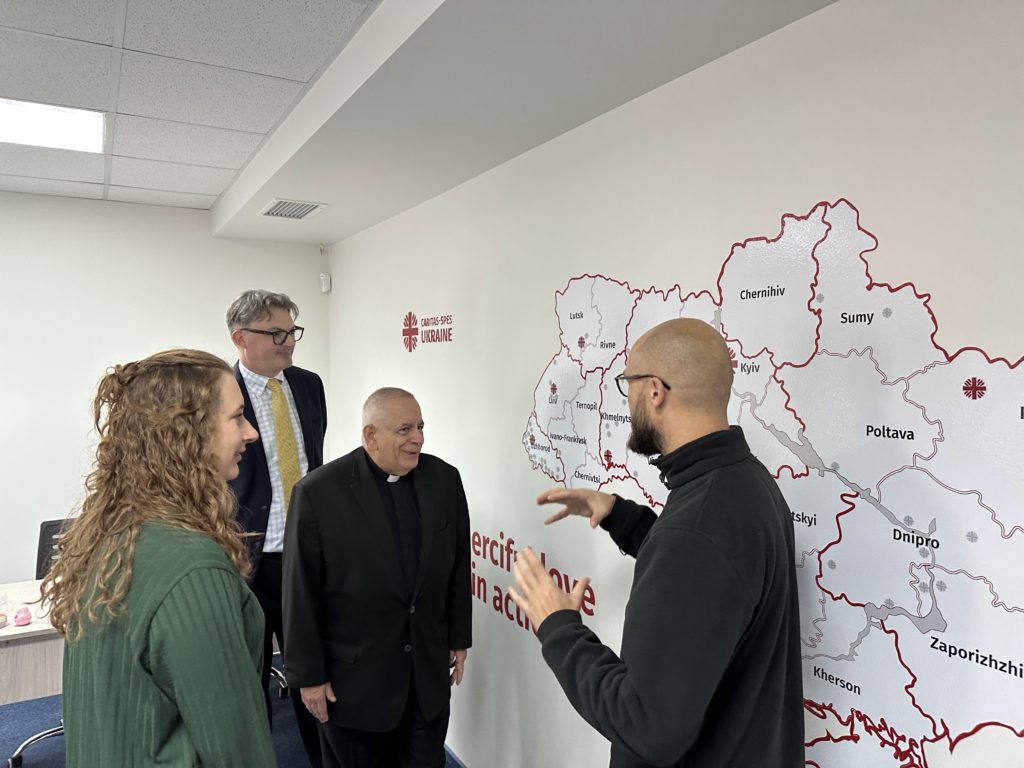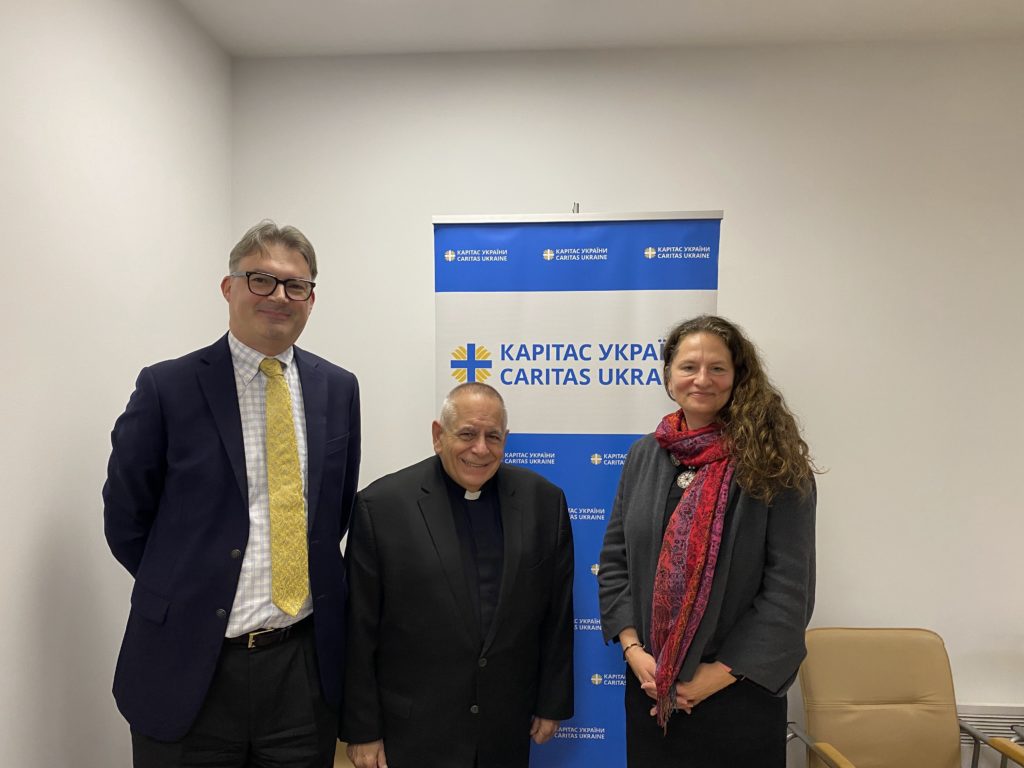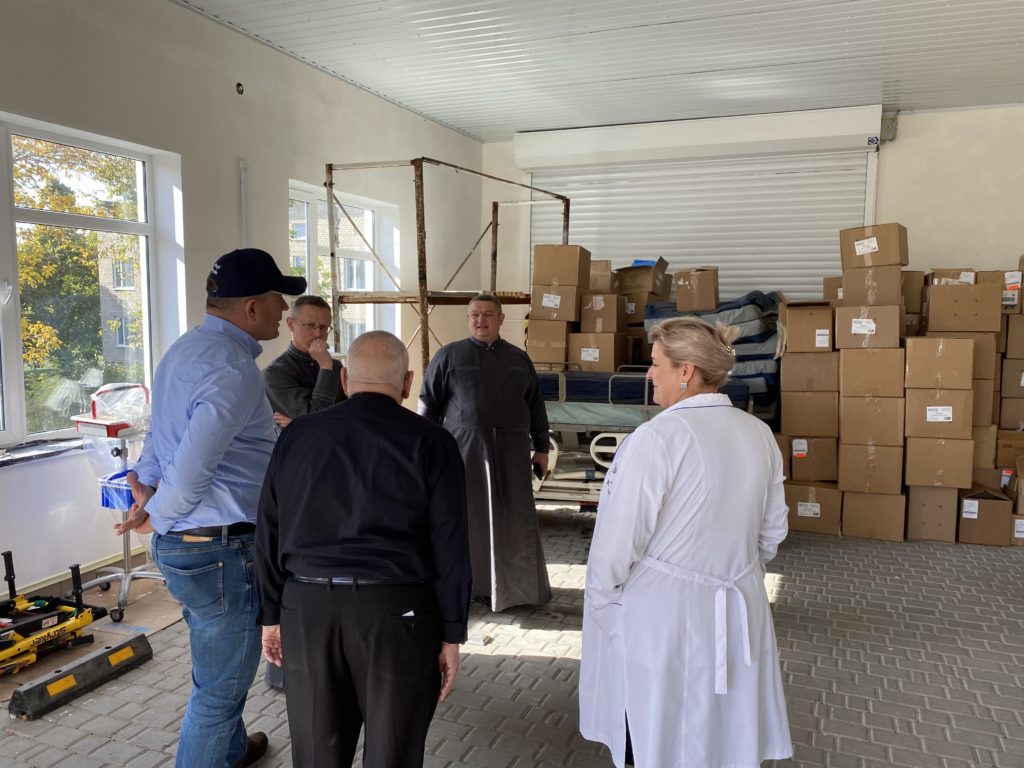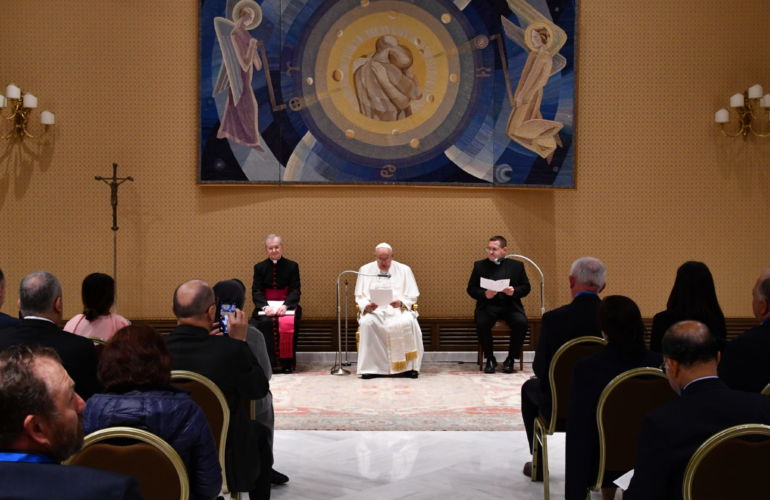Reflections on a Third Visit to Ukraine During a Time of War – 20/10

19-20 October:
After a full day of riding from Lviv to Kyiv on 18 October 2023, our first meeting the next day was with the Papal Nuncio to Ukraine, His Excellency Archbishop Visvaldas Kulbokas, who has offered ICMC very wise and strategic guidance for our partnership programming in Ukraine. The Papal Nuncio is a man of deep faith and sensitivity to the suffering people of Ukraine, so, on this occasion and in all of our face-to-face and remote meetings, he asks if we could start with prayer since he is convinced of our deep need for God’s all-powerful intervention to bring peace to Ukraine and so many other places in the world that are torn apart by hatred and violence. The Archbishop was joined by the First Secretary of the Embassy of the Holy See to Ukraine, Msgr. Joseph Maramreddy. Both officials sat posed with notebooks in their hands. They were anxious to hear about the visits we already had made in Lviv, the reports we had received on ICMC’s support to dioceses for both emergency responses and for professional psychological support to the internally displaced and other war-affected people, and about the interaction among the various global Catholic-inspired humanitarian organizations that are members of the Catholic Response for Ukraine (CR4U) Working Group that ICMC is privileged to convene.

The Archbishop also showed great interest in the close partnership among the Catholic Health Association of the USA (in particular, their two member organizations, the Hospital Sisters Health System and Catholic Medical Mission Board), ICMC, and the Knights of Columbus to bring a container of much-needed medicines and medical equipment to hospitals in Ukraine and in ICMC-Knights of Columbus cooperation in organizing intensive trauma treatment workshops for returning military and their families.
Our next stop was at Caritas Spes, the national Caritas, or Catholic Charities, organization of the Latin Catholic Church in Ukraine. I was very enthusiastic to visit there with Fr. Vyacheslav Grynevych, National Director, and his staff since, in the early 1990s, while serving at the International Headquarters of Caritas Internationalis, headquartered in Vatican City, I had the honor of assisting with the formation of many such charitable organizations, during the early 1990s, as the Catholic Church emerged from domination and persecution under the old Soviet regime to the practice of its full Gospel mission of Teaching, Service, and Worship. I started by offering solidarity to the staff of Caritas Spes since their warehouse, full of relief equipment worth millions of dollars, was recently destroyed in a bombing. ICMC has been pleased to partner with Caritas Spes on a few emergency aid projects to care for internally displaced persons escaping open warfare and bombing, especially in the Eastern parts of Ukraine, and in sponsoring summer camp programming for intellectually and physically challenged children, including many who had fled from other parts of Ukraine to more stable places in the country.
On that last point, however, Fr. Vyacheslav and his colleagues shared their experiences in helping the children deal with many alarms and the need to take shelter since the invaders also launched indiscriminate bombings in residential areas in many parts of the country. The Caritas Spes staff shared their thanks and the joy that so many children could benefit from the support offered by ICMC in these Caritas-operated programs. They also spoke of their successful efforts in extending such mental health and other services to the villages through a network of mobile home programming. They asked for more ICMC help with the mobile programming –I promised them our best efforts to seek additional donor support for these vital programs that bring hope, resilience, and a determination to live beyond the war to so many people in Ukraine.

Our final visit in Kyiv was to the offices of Caritas Ukraine, the national headquarters of the Greek Catholic diocesan Caritas agencies network. There, Ms. Tetiana Stawnychy, just returning to her office after an exhausting day of meetings, generously offered hospitality to us and informed us about the heroic work of this organization. Again, I remember when Caritas Ukraine was started, with very few staff members, and was mainly a home care program for the elderly, disabled, and people living with HIV (in the days before anti-retroviral treatment was developed and made accessible). Today, Caritas Ukraine consists of almost 20 diocesan and other local offices located in eight regions of Ukraine. Nearly 1000 employees and volunteers are involved in its projects, and in recent years, the annual budget of Caritas Ukraine has amounted to 1 million euros.

We concluded our meeting at Caritas Ukraine by “brainstorming” with Tetiana what kind of partnership could be explored for ICMC and Caritas Ukraine. I suggested that we should consider strategic reflection, research, and strategizing on the long-term impact of this war –even after peace has been achieved.
On the next day, we spent most of our day traveling from Kyiv to Odesa, the major port city of Ukraine, which has been subject to many missile attacks resulting in a virtual shutdown of the port, which has made it impossible to ship much-needed wheat, sunflower oil, and other food products that are desperately needed in Africa and low-income countries in other parts of the world. But, before I dwell on Odesa, I first would take you on a detour that we experienced during our trip to the port city. In fact, we spent several hours exiting the main highways and being treated to very long and bumpy rides on rural roads. Our objective in taking this detour was to meet Fr. Bilski, a Greek Catholic priest who is a pastor in a much-attacked area of Eastern Ukraine but also coordinates hospital chaplains in many other areas of the country. ICMC and the Knights of Columbus worked closely with Fr. Bilski to deliver to rural hospitals some of the medical equipment and other materials that we shipped from the USA, with the help of the Catholic Health Association of the USA.

Words cannot adequately capture the deep gratitude shown to us by the directors and staff of these two hospitals –their joy helps to ease the pain in our backs and legs after riding so long on these bumpy roads! Both facilities were a lifeline, not only to the long-term residents of these rural towns, each of which was approximately one hundred kilometers from the nearest city-based health facility. Now, they also were serving the influx of persons displaced from “hot zones” of Ukraine that caused so many to flee from where they had been born and expected to live out their lives. Fr. Bilski and the medical staff in these facilities happily showed us the beds, the mattresses, the diagnostic equipment, and even more basic resources, such as crutches, that they had received. Then Fr. Bilski and the local chaplain showed us spaces for chapels offered by these State-run hospitals so that the patients could have a place to pray and seek emotional and pastoral support from the priests assigned to serve there.




